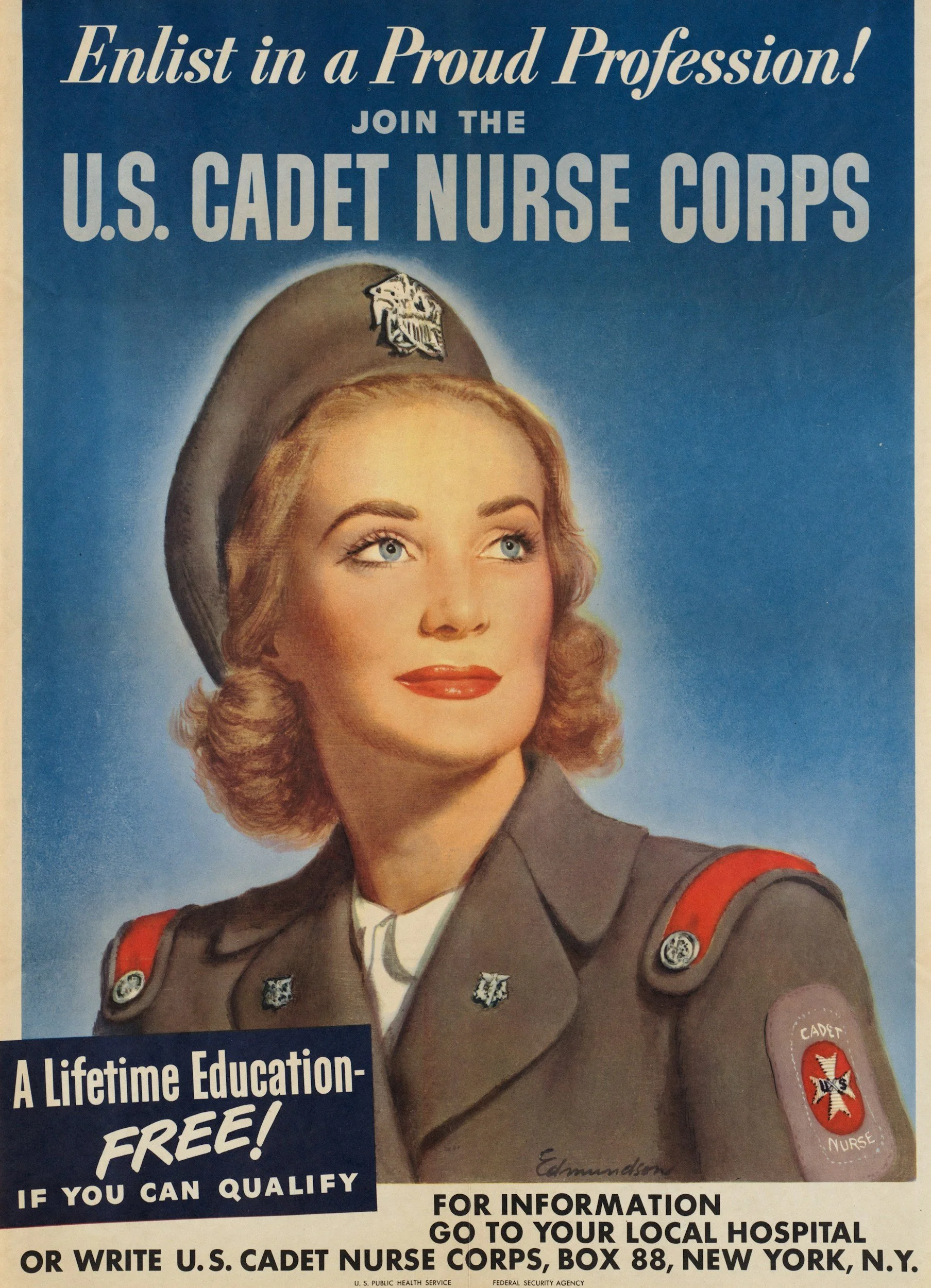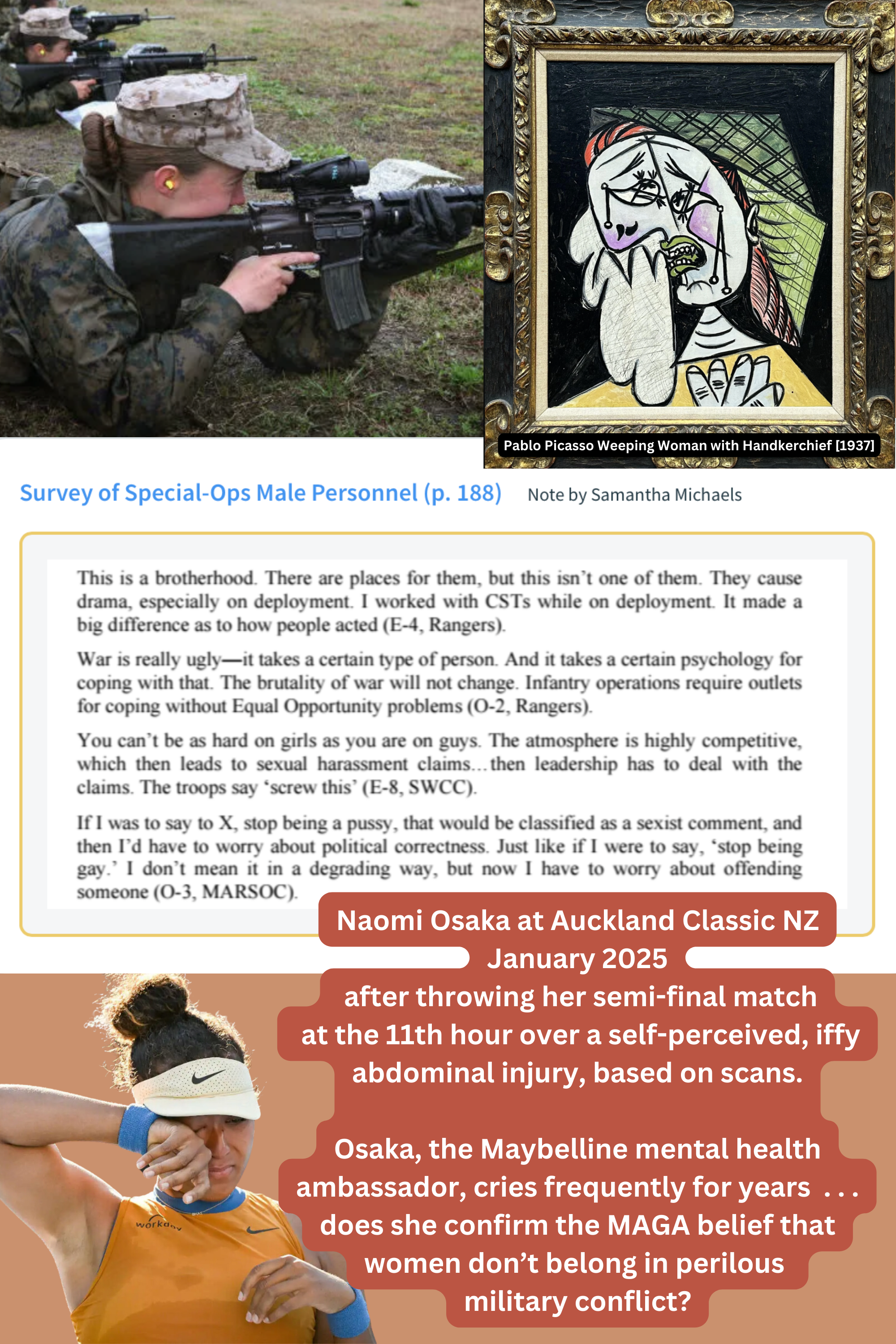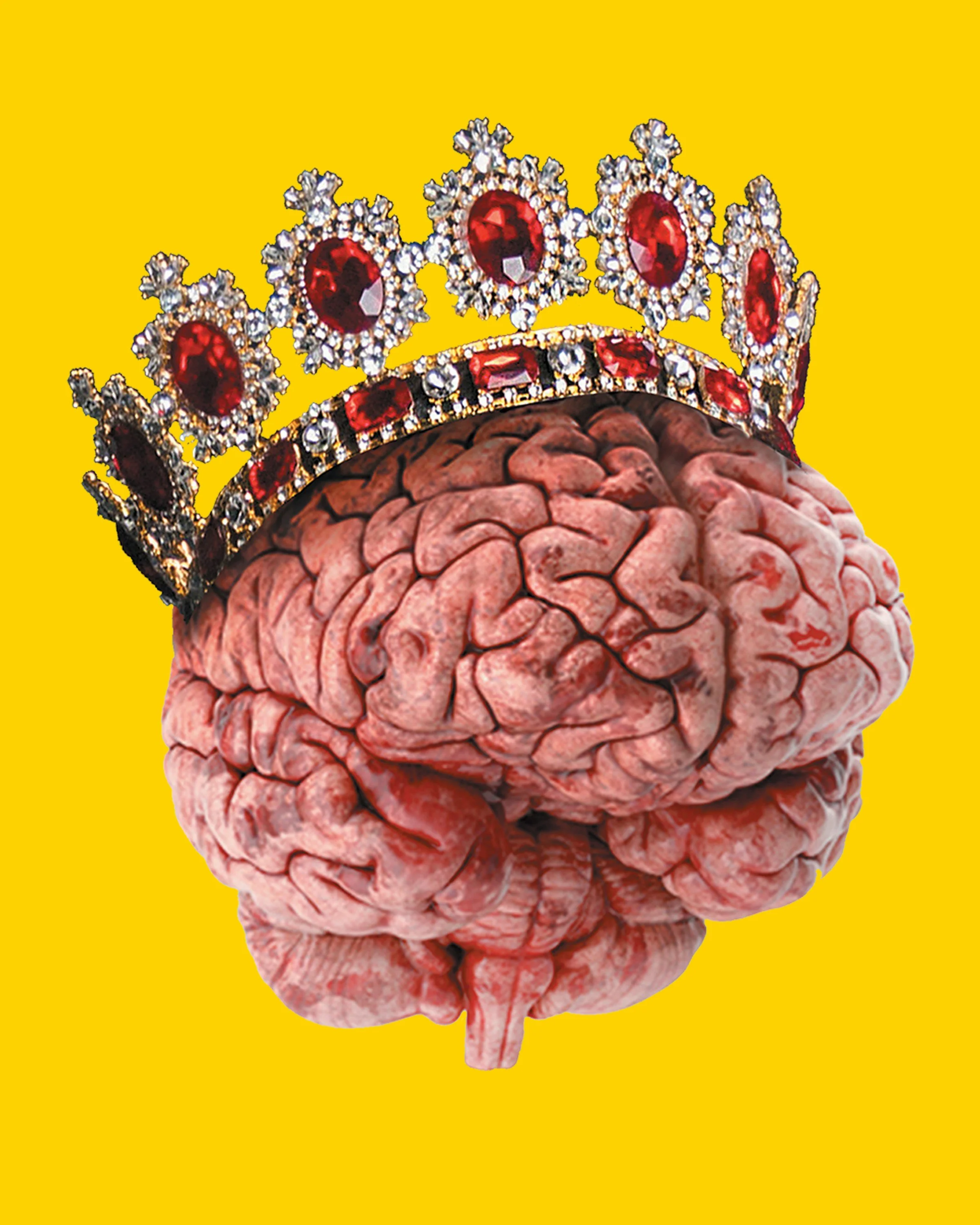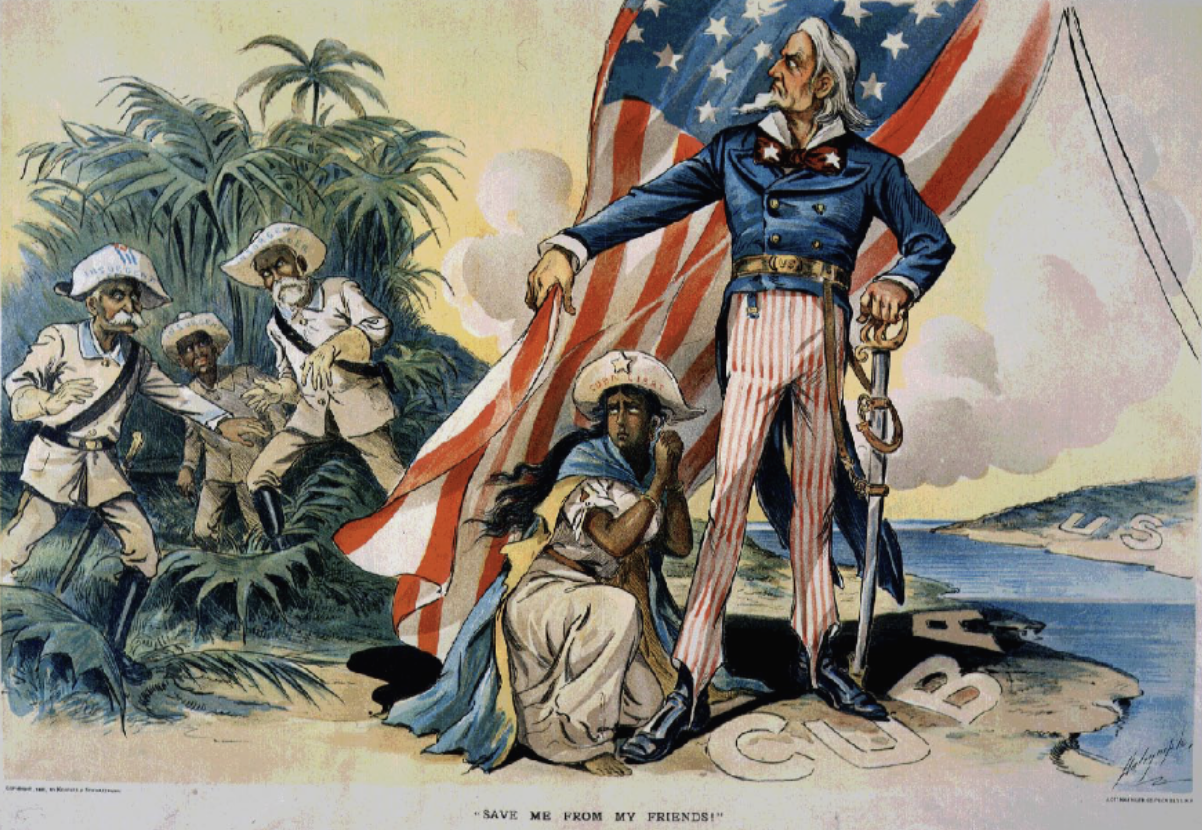Does Naomi Osaka’s Crying Give Support to Pete Hegseth’s Belief that Women Fold in Combat?
/Trump’s Man Pete Hegseth’s Views on Women
President-elect Donald Trump nominated former FOX News host Pete Hegseth to become Secretary of Defense in his administration.
There are many typically-disqualifying issues in Hegseth’s resume such as no experience managing any large organization, let alone the US Military. I’ll leave his well-established drinking problem, financial mismanagement at two veterans nonprofits, and inability to manage even a small staff aside.
AOC’s interest in Hegseth’s nomination is focused on his strongly-held beliefs that American women should not serve in combat. On November 7, 2024 Hegseth said on a podcast hosted by Shawn Ryan, that the military “should not have women in combat roles” and that “men in those positions are more capable.”
“I’m straight up just saying we should not have women in combat roles. It hasn’t made us more effective. Hasn’t made us more lethal. Has made fighting more complicated.”
Hegseth insists that he isn’t suggesting women have no place in the American military. But they should not be in jobs such as SEALs, Army Rangers, infantry, armor and artillery where “strength is a differentiator.” Hegseth insists that the military lowered standards, to get more women into combat roles. All branches of the military insist they did not decrease the standards for any of these combat jobs.
Defense Secretary Ash Carter’s Order in Late 2015
This debate is not a new one and many Republican members of Congress support Hegseth’s views. In the aftermath of then-Defense Secretary Ash Carter’s order in late 2015 that the military open all military jobs to women, there was severe pushback by the Republican party.
Carter said then that the military could no longer afford to exclude half the population from high-risk military posts and that any man or woman who meets the standards should be able to serve.
In the view of Anne of Carversville, any military woman who meets the standards of combat-related positions should be able to serve. I am a second-wave feminist, not a third wave member, who would be my daughter or granddaughter.
Should Professional Women Weep in the Workplace?
I found myself very disappointed last week with professional tennis player Naomi Osaka’s continued weeping in public. This has been going on for years now, and Naomi’s tears are used against all women — including our military women — as evidence that women don’t have what it takes to serve in high-stress situations and especially combat.
Most recently, Osaka was weeping when she withdrew from her Auckland Classic match last Sunday, a charity leadup tournament to the now-happening Australian Open. The details of her throwing the match to Denmark’s Clara Tauson involved an alleged abdominal muscle pull that prevented Naomi from continuing.
Days after Osaka posted this update about her injury:
"The MRI, it wasn't fantastic, but it wasn't bad at the same time. "I'm pretty optimistic about playing my match. I mean, for sure I'm going to play my match. [Osaka is referring to the Australian Open, where she won her first match today against Caroline Garcia. Good job Naomi!]
I believe that Naomi Osaka has pulled out of more confirmed pro-tennis tournaments and in-process matches like the Auckland Classic than any other woman in tennis. Probably more than any tennis player of any chosen gender. Tears are usually part of the event, and it seems that Osaka has decided that the tears work to her advantage.
Brave Together: Naomi Osaka Teaches Us How to Face Anxiety and Depression, Compliments of Maybelline . . . Exactly How Does She Do That?
I seriously considered if I wanted to go this route of writing about Osaka’s crying. But Naomi has cried so often and cried foul so often — like when one person in a crowd of 10,000 people insults you, and you’re not having it, you bring a tennis match for the other 9,999 people cheering you on to a halt — I am concerned about the messages she is sending young women and all women at large.
Why are these tears a reflection of bravery? Why is Naomi Osaka brave?
Naomi Osaka is also Maybelline New York’s first Brave Together Ambassador, a new assignment announced in October, 2024 in advance of World Mental Health Day. Osaka has events in Melbourne attached to this assignment.
I found that fact troubling, to be honest, especially after watching Osaka’s Maybelline events on video. When brands are stepping in as mental health counselors to women, you damn better well know what you’re doing.
Did you speak to prominent mental health leaders in the field before making this appointment, Maybelline?
I have zero credentials in the field of women’s mental health, but I have read deeply in this field for decades. I question your homework, Maybelline, regarding your understanding of the traits of diverse personality types — female or male — and how they manifest themselves in ongoing behavior.
It’s one issue when Naomi Osaka is an ambassador for Louis Vuitton. Fine and dandy. When you, Maybelline, make Naomi Osaka a mental health ‘expert’, I’m surprised you haven’t taken more heat from the professional community.
Image by Gaspar Uhas on Unsplash
Never Let Them See You Cry
Generally-speaking second wave feminists didn’t weep at work. This reality is considered outmoded by today’s mental health experts. Let me be clear. In my research on women crying at work, Anne is the one not with the program. My experiences are outmoded, out of touch — although the more medical and sociological research I read, science may say “Thank goodness, someone spoke up here. Anne’s making a lot of sense in her concerns.”
One night in particular, many years ago, I found myself in the ladies room throwing water on my face after a terse, Monday night meeting debate with Howard Gross, who preceded Grace Nichols as president of Victoria’s Secret.
When Howard interviewed me about joining Victoria’s Secret, he said “Well, you’re a Les Wexner hire, so we really have nothing to talk about. So do you play golf?”
My attitude was that hell would freeze over before I ever cried in an executive meeting at VS. But I admit to doing some deep breathing in the ladies room at break-time, throwing water on my face, as more than one of my colleagues gave me a hug in the ladies room, while expressing admiration for my refusal to fold in front of Howard Gross and my colleagues.
That is the way I rolled in every job I’ve ever had. I have zero desire to learn why it’s okay for women to weep at work — except under exceptional circumstances.
Thinking about 1] my old-school life at Victoria’s Secret, 2] the upcoming Tuesday January 14, 2025 confirmation hearing of FOX News host Pete Hegseth to become Secretary of Defense in the Trump administration and 3] Naomi Osaka’s inability to stop crying when she has any serious challenge, I decided to bring myself — and now you, dear readers — up to speed on the thinking of the professional health community on the topic of women weeping at work.
The White Man’s Burden
There’s one event I didn’t share with you that also impacts my thinking on this topic [although it’s always been my view]. A few weeks ago on the Washington Post, I read a term that I thought had gone obsolete. It’s the phrase “white man’s burden.”
Men were speaking openly about the general lack of competency among women and people of color in any endeavor, and that white men had to rush in and clean up the messes we create. I responded with my usual wit “You poor, poor dears. Having the full weight of our collective incompetency on your strong, white men’s shoulders . . . “ I find that well-written sarcasm can be highly effective in such a situation. So they called me a bitch. I probably am one at times.
My problem is that even though I’m up there slugging away at these “white man’s burden’ stereotypes of women and people of color, I probably don’t want Naomi Osaka in my foxhole.
Give me Liz Cheney or Olivia Troye, women I know will absolutely have my back. And I’m a Democrat, make no mistake about that. Give me Senators Amy Klobuchar and Tammy Duckworth — one or both. Give me Jennifer Rubin or Michelle Obama. All of these women will have my back if we’re in battle together. And I will have theirs as well. They will not crash and burn in a pool of tears.
Most people find me to be a very committed humanist, and that reality makes me happy. But I do not respond positively to women who weep under stress regularly. Now any person can have an emotional moment and shouldn’t have it held against them. But when you’ve wept your way through a troubled career for years now . . . I don’t know what to say except that I must really be old-school. It leaves me cold.
Anne and Her AI Questions About Professional Weeping Women
In Phase One of this new endeavor, I have turned to my most-trusted, scholars-level AI program to get us started. My program, which will remain nameless, is an excellent tool for this kind of discussion. It’s used by The Economist-level media [which I also subscribe to] and performs best on qualitative, complex questions that aren’t of the moment.
It’s pretty ‘woke’ but highly specific if you know the right questions to ask.
To get us going,there is the sequence of questions I asked AI about women crying at work in 2025. I have completed this piece of research and will share the responses each day this week. At the same time, I will be researching new specifics about this topic of women crying at work and also sharing links of relevant articles in international media on the subject.
I have no agenda except to understand and challenge directly — as you will see I do — this idea that there is no downside to women weeping in public, and especially connected to work. This challenge comes in response to what I feel is an almost abnormal emphasis on encouraging weeping at work and refusing to acknowledge any downside. Composure is not a virtue but a slavish restraint on women’s behavior.
I believe there is a major price that women pay when they weep regularly and then expect to be trusted by colleagues to hang tough in a challenging situation. Or to be promoted to the highest levels of an organization. It goes against all common sense for us to trust weak, weeping people in a situation that requires a strong backbone.
If they are highly-publicized women, I also believe that their actions impact all women in many countries. This is my major problem with Naomi Osaka’s constant crying. I will be looking for information that negates my views on women weeping at work, because I am the odd woman out in a preliminary view on women crying. Anne needs to get with the program on women and our embrace of mental illness as no big deal. [Anne’s head is in her hands.]
And I support the idea that men can sometimes be confused about how to deal with women in this situation. To this day I cannot understand how a minor suggestion I made on a retail floorset resulted in my client’s design director bursting into tears in front of 20 people two decades ago.
She was very talented and I recruited her to this job for my client. I just did not know what to do when a suggestion I made — one oozing with compliments about another alternative that she had developed that was generally stupendous — received a shocking response from her.
Her ‘first thing one saw on entering the lingerie department selection’ paled in comparison to this other alternative, which was also her work.
My client’s design director was shattered by my suggestion of a switch. She didn’t cry a little. It was like the Titanic was sinking and she was on it. Meanwhile, I was speechless but knew not to apologize. I had done nothing wrong.
Weeping people — do we have weeping men? — do make people like me walk on eggshells and choose my words very carefully. It’s not exactly a creative incubator situation. And you can expect MAGA men to ride this bucking bronco wildly in the next few years. Just like my reading about the “white man’s burden” on the Washington Post recently, we are going to hear some shocking conversations about women’s abilities in the coming days.
I am devoted to sharing all I know on this subject, and I hope you already understand that I see all the complexity involved in the narratives and how I believe women can be our own worst enemies in the quest to be taken seriously in MAGA world. ~ Anne





